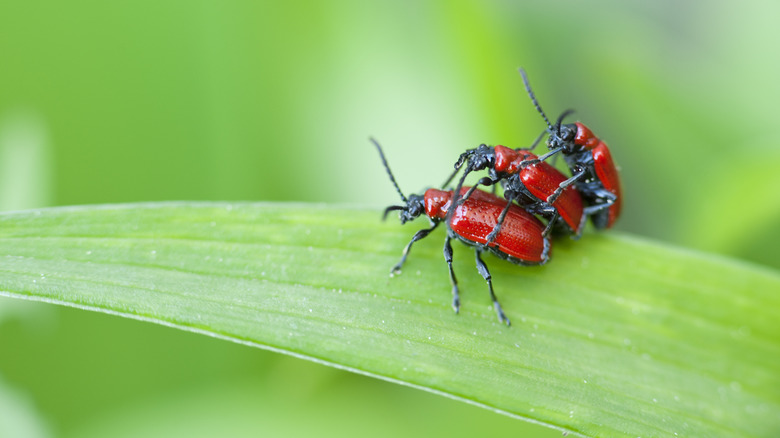Our Gardening Expert's Tips For Keeping Red Lily Beetles Away With Pantry DIY Treatment
Asiatic lilies are an easy-to-grow garden bulb that produce colorful flowers on glossy green stalks in June. But there are invasive pests that can decimate your lilies and you may not even see them until it's too late. Red lily beetles (also known as scarlet lily beetles or lily leaf beetles) are tiny bright red beetles that lay eggs on Asiatic lilies; once the larvae hatch, the stems are coated with a black sludgy goo, and they eat the stalks, leaves, and buds until nothing is left. Fortunately, a simple preventive treatment made from pantry ingredients can keep lily beetles at bay.
A few years ago, a long-time friend and gardening compatriot of mine posted a picture on social media of a commercial insecticide she was planning to use on red lily beetles that were attacking her lilies. That same week I'd read about how toxic this product was. I let my friend know that, even if it was effective, it was harmful to pollinators. She took my advice to heart and started seeking organic solutions.
But red lily beetles are formidable. They seem to show up out of nowhere and once their eggs are laid, the plant is already damaged. One key to dealing with these pests is prevention. It's important to watch for them every day in mid-spring, and preventively treat your lilies. I've developed a homemade concoction that seems to be quite effective. When used regularly, it keeps these beetles from destroying my Asiatic lilies.
Make this simple non-toxic preventive
You can use non-toxic commercial products, such as neem oil or insecticidal soap, to prevent red lily beetles. But the recipe I developed is handy for when you don't have those products on hand or want to save money. All you need is oil (like olive, vegetable, or grapeseed oil), apple cider vinegar, and garlic powder. Take a small glass spice jar with a removable plastic shaker lid. Add ⅔ oil, ⅓ vinegar, and 1 teaspoon of garlic powder. You can also use unpeeled garlic cloves, but then you should let it sit for two days before using. Put the lid on and shake vigorously.
If you know when lily beetles start appearing in your area, apply the oil as a preventive beforehand. In the Northeastern U.S., that is mid to late April. Keep your eyes peeled and the minute you see them, gently shake them off the plant (you can also squash them). Then apply the garlic solution. Shake the container to blend, then pour slowly onto the top cluster of leaves. Let it drip down the stalk and onto the leaf nodes.
Apply this solution when the weather is dry. Once it rains, reapply it. One spice jar will cover about a dozen lily plants two or three times. Pour slowly so you don't use too much; it's not necessary to coat the entire plant. These beetles dislike the smell of both garlic and vinegar and will stay away.
Be diligent about red lily beetles
I wish I could say that one application of this garlic-vinegar solution would keep red lily beetles away the entire season, but it's not quite that easy. These beetles can be voracious eaters and lilies are their main food. They will eat all summer-blooming lilies (including Asiatic, Oriental, and Orienpet lilies) and are also known to go after lily of the valley, fritillaria, and Solomon's Seal plants. They won't go after your canna lilies, calla lilies, or day lilies, so you won't need to worry about those plants.
I've had good luck with this solution. But when I've discontinued using it too early, I found that the beetles returned. The best regimen is to start with this solution in mid-April (or earlier if you see the beetles) and apply once a week until flower buds appear. Once the buds show some color, they should be safe. But keep your eyes peeled, because the beetles may occasionally appear after lilies have started flowering. These late-season visitors may be larvae that have hatched from nearby infestations.
If you see black sludgy goo on your lily plants, cut the affected portion and throw it away. You will lose your flowers for the season, but the removal of this damaged plant material will keep these beetles from reproducing. Regular application of this homemade garlic oil can help prevent a red lily beetle infestation from devouring your lilies entirely.


